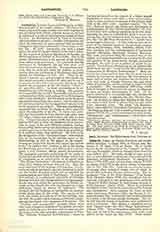

Laderchi, JAMES, an Italian Oratorian and ecclesiastical historian, b. about 1678, at Faenza near Ravenna; d. April 25, 1738, at Rome. He is chiefly known for his continuation of the “Annals” of Baronius and Raynaldus, which he brought down from the year 1566 to 1571. His work, though of some usefulness, is not sufficiently critical and is encumbered with numerous unimportant documents. It appeared at Rome (1728-1737), and extends from volume XXXV to volume XXXVII in the latest edition of Baronius (Bar-le-Duc, 1864-83). Laderchi was also the author of several other historical works, two of which involved him in heated literary controversies. His voluminous “Life of St. Peter Damian” (Vita Sancti Petri Damiani, Rome, 1702) was mercilessly but excessively criticized in the anonymous work entitled: “Sejani et Rufini dialogus de Laderchiana historia S. Petri Damiani” (Paris, 1705). When he published his edition of the “Acts of the martyrdom of St. Crescus and companions” (Acta passionis SS. Cresci et sociorum martyrum, Florence, 1707), the Servite G. Capassi attacked their authenticity and trustworthiness in a letter to the Roman scholar Fontanini. The letter fell into the hands of Laderchi, who published it with a refutation. This elicited a vehement answer from Capassi under the title “Nugae Laderchianae” (Genoa, 1709). The ecclesiastical authorities seem to have put an end to the controversy; both works were placed on the Index (June 22, 1712). These controversies probably occasioned the composition of “La Critica d’oggidi” by Laderchi (Rome, 1726). He was also the author of the following works: “De Basilicis SS. Martyrum Petri et Marcellini dissertatio historicit” (Rome, 1705); “Acta S. Caeciliw et transtiberina basilica illustrata” (Rome, 1722); “Acta SS. Christi martyrum vindicata” (Rome, 1723); “Sanctorum patriarcharum et prophetarum, confessorum… cultus perpetuus in Ecclesia catholica assertus et illustratus” (Rome, 1730).
N. A. WEBER

